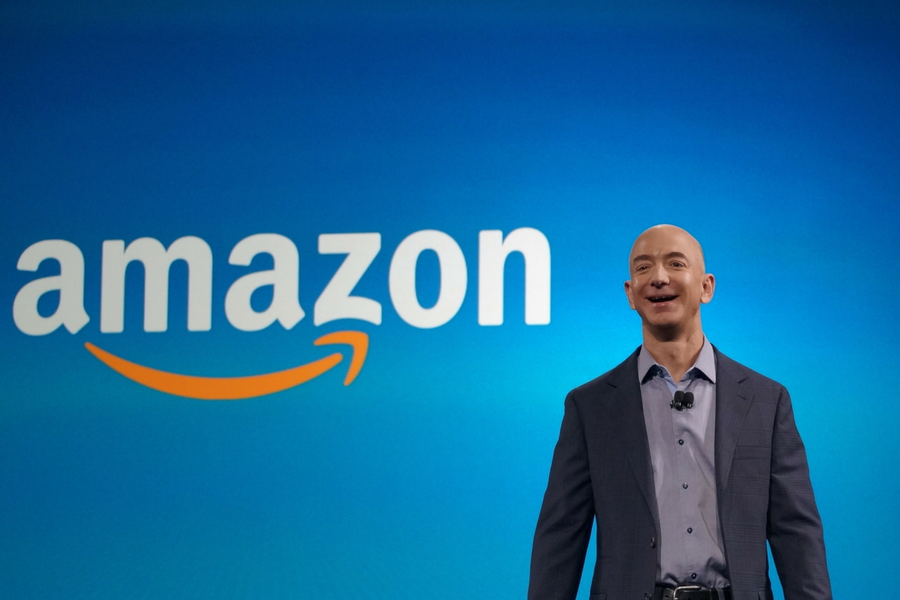Happy hump day. Let’s do this.
1. Bezos had his phone ‘hacked’ by the Saudi crown prince
A WhatsApp file sent to the world’s richest man in 2018 from Mohammed bin Salman personal account was reportedly used to steal data from the phone of the Amazon boss, according to an astonishing account in The Guardian.
The future king of Saudi Arabia has been chatting on WhatsApp when an infected video file was sent to Bezos on May 1 and it managed to extract “large amounts of data” according to anonymous sources who spoke to The Guardian.
Five months later, journalist Jamal Khashoggi, who worked for the Washington Post, the paper Bezos owns, was killed and dismembered when he visited the Saudi consulate in Istanbul.
Nine months later, in February last year, Bezos published his extraordinary “No thank you Mr Pecker” letter, in response to what he called an “extortion and blackmail” attempt by US tabloid the National Enquirer, which had obtained nude photos of the billionaire, text messages and provocative images of his girlfriend, and was trying to kill a story in the Washington Post in return for not publishing them.
Saudi Arabia has previously denied it targeted Bezos’s phone and blamed Khashoggi’s murder on a “rogue operation”.
While an investigation into how the Bezos photos and texts were obtained concluded with “high confidence” that the Saudis were involved, this is the first time potential details about how have emerged.
You can read it all here.
2. Uber sells its Indian Eats business
Uber cost cutting drive continues, with the tech startup selling its Indian food delivery business to local competitor Zomato in exchange for 9.99% stake in the rival. The Indian Uber Eats drivers and customer data will transfer to Zomato under the deal. Zomato is about 4x times bigger than Uber, with 40 million deliveries a month, compared to Uber’s 10 million, but that 25% boost will help it in the battle against the other dominant player in India, Swiggy. Combined, the two already control 80% of the Indian food delivery market.
The New York Times has more here.
3. Google backs EU ban on facial recognition,
The EU’s plan for a five-year temporary ban on facial recognition technology has split the tech giants, with Alphabet and Google CEO Sundar Pichai coming out in favour of the move in an opinion piece for the Financial Times.
Meanwhile Microsoft chief legal officer Brad Smith went the other way, comparing the ban with trying “to solve a problem with a meat cleaver or a scalpel”.
Pichai gave an address in Brussels this week, arguing it was “up to governments to chart the course” and best they “tackle it sooner rather than later and give a framework for it”, backing a “waiting period before we really think about how it’s being used”.
4. The 5G mobile phone boom is coming
Worldwide shipments of devices — PCs, tablets and mobile phones — will total 2.16 billion units in 2020, an increase of 0.9% from 2019, according to tech research company Gartner, Inc.
Gartner research senior director Ranjit Atwa said the increased availability of 5G handsets will boost mobile phone replacements, with the 5G phone market expected to grow from 12% of mobile phone shipments in 2020 to 43% by 2022.
PC shipments are still forecast to decline in 2020 and beyond, as the migration to Windows 10 winds down. After three years of growth in the professional PC market, replacement levels will also decrease Gartner predicts.
Meanwhile Australia’s spend on tech products and services is expected to increased by 5.7% – well ahead of the global 3.4% figure – this year to just under $100 billion. Expenditure on hardware, software, and ICT services is predicted to rise by $5.4 billion.
Worldwide IT spending is projected to total $3.9 trillion in 2020 and surpass $4 trillion next year, with Australia’s spend hitting $103 billion in 2021.
5. A trove of NSW data
The NSW Government’s central data repository, which launched in 2009, announced this week that it has more than 10,000 data sets now available to the public.
The NSW Open Data Portal provides businesses and individuals access to data sets from all state government departments and agencies – think things like Fuel Check, Fires Near Me and the NSW Education School Finder.
Data, Insights & Transformation Executive Director Simon Herbert said the non-personalised data can be used in a number of ways to help make life easier.
“We strongly encourage the private sector to make use of NSW Government open data, under the open licensing frameworks, to find new and innovative ways to use the data,” he said
The data sets available through Data.NSW are also used during major data hackathons, including GovHack. More details from the Data.NSW here.
BONUS ITEM: Speaking of the cost of tech, we read an essay from the Lowy Institute over the break about the fraught F-35 Joint Strike Fighter project that outlines how RAAF chiefs are on the hunt for a new bomber, just as Australia’s most expensive defence equipment purchase, with the “largest cost overrun of any Australian defence acquisition in history” (yes, we know the submarine project is crying out “hold my beer!” at this point) completes, a decade late. Alarmingly, by 2030, the F-35 could be rendered ineffective. The retired RAAF chiefs sounding the alarm “have done the nation a service in highlighting the shortcomings in contemporary Australian strategic thinking – even if they were involved in making it so” Dr Peter Layton writes. Sigh.
At least it can do this:
Because we all love a bit of F-35 #slowmo. Watch an #F35 release flares in #slowmotion at @EdwardsAFB. ⚡ pic.twitter.com/AIRCGLdw0L
— F-35 Lightning II Joint Program Office (@theF35JPO) January 21, 2020
Have a great day. Find me on Twitter at @simonthomsen.




















Trending
Daily startup news and insights, delivered to your inbox.